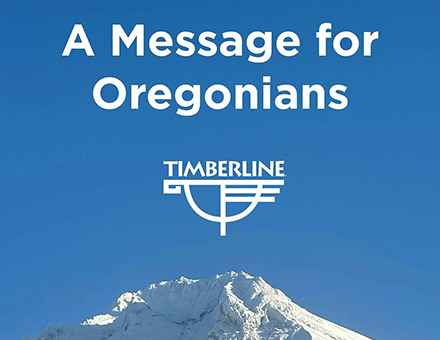SAM Magazine—Government Camp, Ore., Oct. 9, 2025—As insurers exit Oregon and available insurance premiums skyrocket in response to the state’s legal climate, in which recreational liability waivers are unenforceable, outdoor recreation providers, including ski areas, are in a precarious position. Timberline, which operates on Mt. Hood, addressed this in a message to Oregonians, warning them that prices will be rising due to “unsustainable financial pressure.”
Timberline, which operates on Mt. Hood, addressed this in a message to Oregonians, warning them that prices will be rising due to “unsustainable financial pressure.”
In an Oct. 8 social media post titled, “A Message for Oregonians: Why Prices Are Increasing,” Timberline explained that it was notified June 1 that its insurance carrier would be leaving Oregon, effective Oct. 1, “a casualty of the state’s broken recreational liability system,” the message said. “Without reform, Oregon has become an untenable place for insurers. Timberline, along with other tourism and outdoor operators, have warned for more than a decade that this day would come. Without state-level liability policy reform, conditions will continue to deteriorate.”
Timberline said it was able to secure coverage for the coming ski season, “but only at an extraordinarily high cost.” Specifically, its liability insurance premium jumped 166 percent—part of a 586 percent increase since 2020—and its deductible is 10 times higher than last year’s. “We are absorbing as much of this cost as possible, but cannot shoulder all of it,” Timberline said.
The resort said peak-time lift ticket pricing, tier 2 season pass pricing, and summer ski products (Timberline is open for skiing and riding well into the summer) will all go up in price, but didn’t specify how much.
Liability waivers for recreational activities have been effectively unenforceable in the state since a 2014 Oregon Supreme Court verdict against Mt. Bachelor concluded that enforcement of the liability release signed by the injured plaintiff would have been unconscionable. Efforts to reform this through legislation have repeatedly been tamped down by state government leaders. Most recently, in June, a bipartisan effort to reinstate waiver enforceability made it through committee but Senate President Rob Wagner (D-Lake Oswego) never brought it to the floor for a vote and the bill died when the legislative session ended.
This has created what many are calling an insurance crisis in the state. In its message, Timberline did not fault insurance carriers for the situation. It pointed to inaction by Oregon lawmakers. “… without long-term solutions from the State Legislature, the impacts will be unavoidable; higher costs, reduced offerings, and diminished opportunities for recreation in Oregon. This threatens not only skiers and riders, but also rural communities, jobs, and families who depend on tourism,” the resort said.




